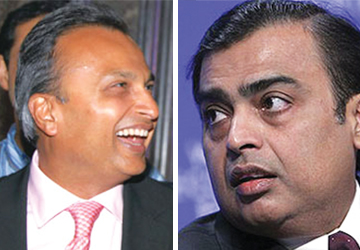
The rumours have been planted so skillfully that it is virtually impossible to pinpoint where the stories originated.
When the giant Reliance Industries Ltd (RIL) held its annual general meeting (AGM) on Friday, 18th June, the big buzz, both before and after the meeting, was not about its massive growth plans, but about Anil Ambani’s possible appearance and the subsequent no show. Given the intensity of the war between the brothers, one may argue that Anil Ambani’s appearance at the AGM, just days after a sort of truce, is certainly headline material. It would indicate a major thaw that could possibly be the first step towards a merger of the two business empires. The question is: Who started the rumour and set off the media frenzy?
Neither Anil nor Mukesh have said anything either before or after the meeting. Yet, every single newspaper, wire service and television channel had carried reports that Anil will attend the AGM, apparently without any basis. Not surprisingly, the shares of RIL as well as all Anil Dhirubhai Ambani Group (ADAG) companies rose steadily through the week and fell significantly on Friday, when the younger Ambani failed to show up as speculated. It is easy to blame the media for wrong reporting, but isn’t it evident that someone deliberately spread the rumour about Anil Ambani’s proposed appearance? It was done so skilfully that it is virtually impossible to pinpoint where the story originated. One particular media house stands out; it has been hyping up the truce as if a complete reconciliation between the brothers is imminent. Significantly however, Mukesh Ambani made no mention of his brother or indicated any significant thaw, even though Anil Ambani had officially welcomed RIL’s entry into telecom through the broadband route with its acquisition of Infotel. ADAG companies have been the bigger beneficiaries of these rumours, which are not limited to Anil’s alleged AGM appearance.
Saga of Denials
Ever since the brothers called a truce, Reliance Communications (RCom) has been the subject of the most extraordinary speculation. It started with media reports that the South African telecom giant MTN group was ready to resume talks with the company. The share price immediately soared. On 3rd June, MTN officially denied any interest in partnering with RCom, but this had no impact on the stock price, because somebody had already triggered new rumours that AT&T was now keen on RCom. This time, even The Wall Street Journal (WSJ) had carried the report. While AT&T issued a categorical denial about being in talks with RCom on 7th June, the company announced that its board of directors had approved a strategic sale of 26% of its equity “at an appropriate premium to the prevailing market price.”
RCom also said it had received proposals from international companies without naming any. By then, the share price had shot up to Rs176.60 but fell a sharp 5% after the AT&T denial. The source of these rumours is again difficult to trace, but reports spread like wildfire and even blogs and news updates of international newspapers, wires and magazines joined in without any independent verification. Strangely, WSJ, which had carried the report, said that it ‘stood by’ its report. In India, one economic newspaper seems to have taken the lead each time. After MTN and AT&T, media speculation about RCom’s potential partner shifted to Abu Dhabi-based Etisalat and the European giant Vivendi. On 22nd June, Vivendi denied The Economic Times report that it was in talks with RCom. Only Etisalat has not denied reports linking it to RCom, but it too has clarified that it is ‘evaluating several options’.
Only time will tell who will finally partner with RCom; but, until it happens, WSJ’s decision to ‘stand by’ its report, takes me back to 1992. A Reliance (then a combined entity) spokesperson had confirmed to me—off-the-record—that it had signed an MoU with DuPont for a strategic stake. When the report appeared, he even called to express his glee that the stock price had risen. By the evening, he was in our office with a letter of denial. When I threatened to publish the fact that the group had confirmed the story, Reliance simply pulled strings in the corporate and editorial hierarchy. I remember, we too had ‘stood by’ our story, since it came from the company, but the ‘deal’ with DuPont never happened anyway.
— Sucheta Dalal